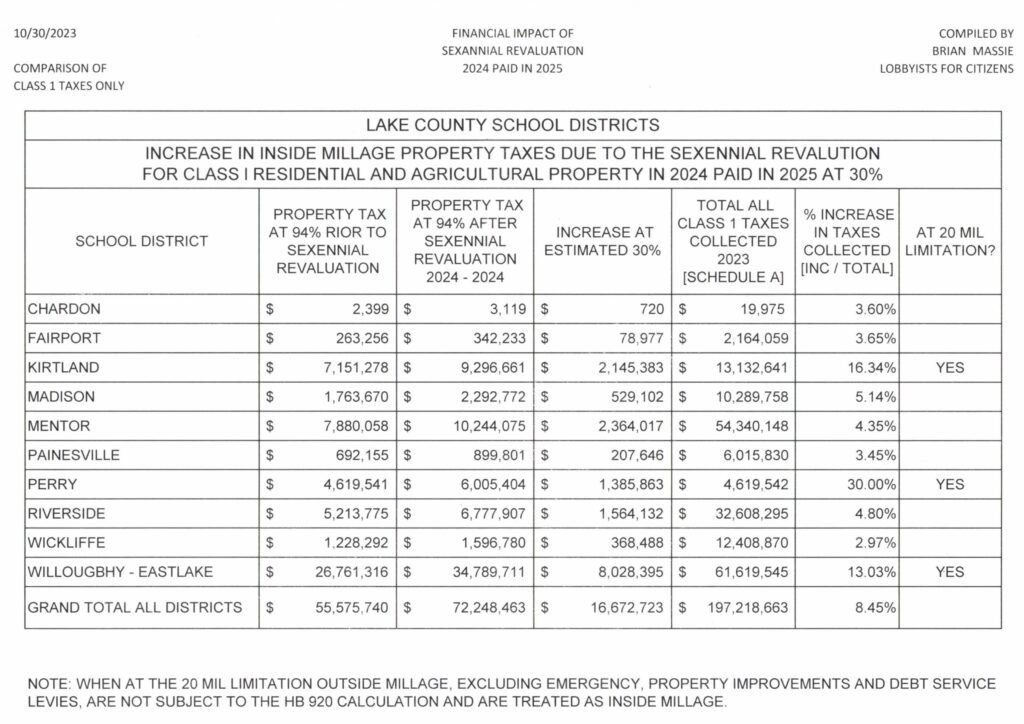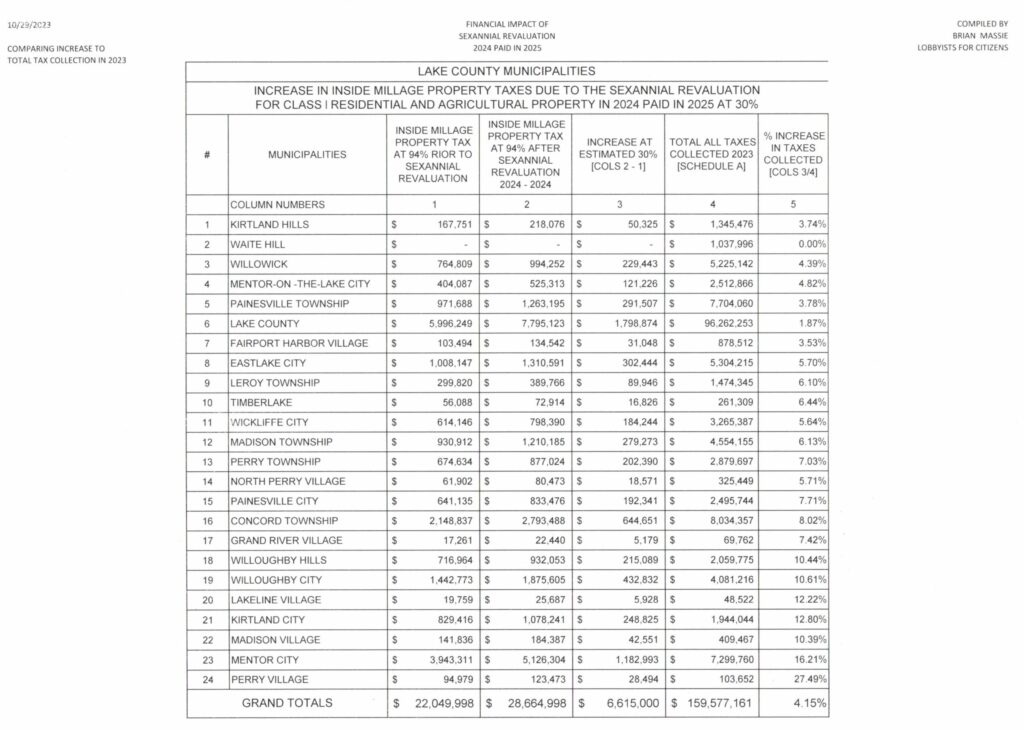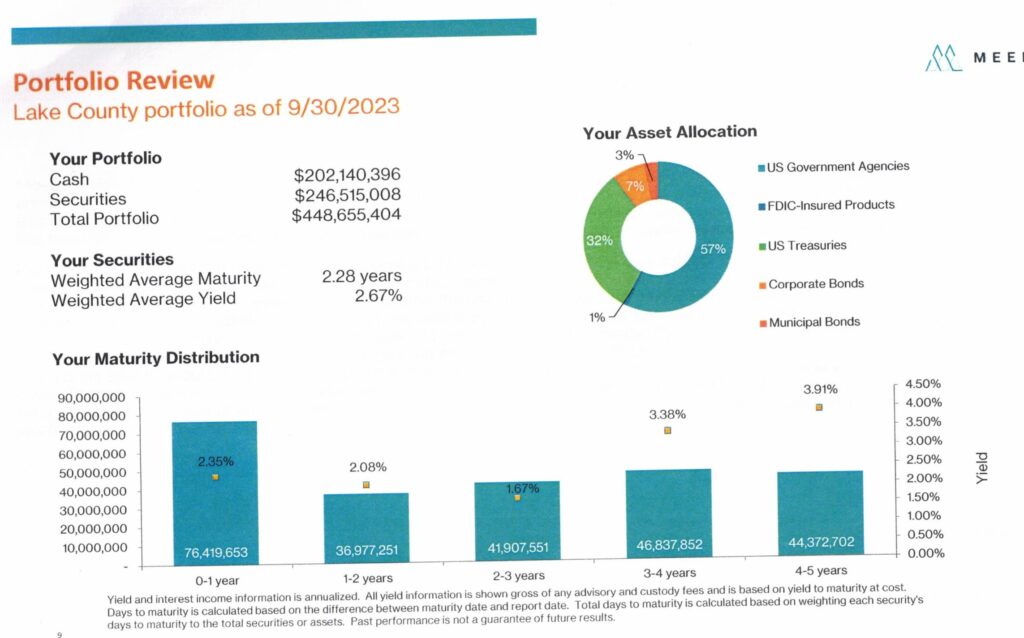
By Brian Massie, A Watchman on the Wall
Warning: This article may cause a rise in your anxiety level. Keep reading at your own risk.
Part 1 deals with the additional revenue to be generated in 2025 for the various political sub-divisions due to the sexennial revaluation.
Part 2 will reveal the financial cost to the taxpayers for the sexennial revaluation.
Why the need for a sexennial reappraisal?
https://tax.ohio.gov/government/real-state/reappraisal-and-triennial-update
“Under state law and Department of Taxation rules, real property in all counties is reappraised every six years and property values are updated in the third year following each sexennial reappraisal.”
Here is the schedule of the triennial and sexennial revaluations for all 88 Ohio Counties. Lake County will undergo their sexennial revaluation in 2024 with the property taxes to be collected in 2025.
Here is the previous article giving the taxpayers a forewarning of the pending increasing property taxes without a vote of the taxpayers.
There are three political subdivisions that all homeowners will have to satisfy: (1) Lake County, (2) the city, township or village where they live, and (3) their school district.
We took the time to determine the financial impact to all nine Lake County School Districts. The schedule below reflects the anticipated 30% increase in property valuation for each school district. The Willoughby Eastlake, Perry and Kirtland School Districts will see the largest gains because of the 20 mil limitation that prevents the reduction in the effective property tax rate due to increase valuations [HB 920].
All school districts will enjoy an increase in revenue without a vote of the taxpayers. This is a result of the “inside millage” not being subject to a vote of the taxpayers.
Let’s define some basic terms pertaining to property taxes.
What is “inside millage”?
“The Ohio Constitution prohibits governmental units from levying property taxes that, in the aggregate, exceed 1 per cent of true value, unless they are approved by voters. This is known in state law as the 10-mill limitation on non-voted or “inside” millage.” The inside millage is not subject to the H.B. 920, therefore the revenue is permitted to increase in proportion to property value appreciation.
What is H.B. 920?
“
“In 1976, the legislature enacted property tax reform known as House Bill 920. Its purpose was to keep inflation from increasing voted taxes.
This is how it works:
Most of a community’s tax millage is made up of taxes voted on by its residents by passing individual tax levies.
When the voters approve a tax levy, they are agreeing to pay a certain amount of money for a specific purpose, over a given time period. Each property owner pays their share, in proportion to the value of their property. The higher the value of the property, the greater their share and the higher their taxes.
When property values increase due to inflation (a reappraisal or update), House Bill 920 is enacted and the millage rate is reduced (creating an effective tax rate). The effective tax rate is then applied to the higher valuation of the property.
What is the 20 mil limitation?
The law specifies that the application of H.B. 920 cannot cause a school district’s effective current expense millage rate (inside and outside combined) to fall below 20 mills (this is referred to as the 20-mill floor).
In the case of school districts, the tax rate for inside millage plus the effective tax
rate on voted millage cannot fall below 20 mills when these taxes are used to pay for
current operating expenses. This is commonly referred to as the 20-mill floor and it
does not include emergency, bond, or permanent improvement levies.
Currently, the Willoughby Eastlake, Perry, and Kirtland School Districts are at the 20 mil floor limitation, and their outside millage is treated like inside (non-voted) millage.
Here is the schedule summarizing the additional property taxes raised by school district because of the anticipated 30% increase in home values.

*****
We then calculated the financial impact of the sexennial revaluation on the various municipalities in Lake County.

Our overall concern is that we see a continued, seemingly unstoppable growth, of the political sub-divisions in Lake County. The speed and amount of growth is rather spectacular . Here is the summary of the County portfolio below. Notice that the total Cash and Securities is $448,655,404.
In 2018, the County had $128,818,000 in investments and $147,794,759 in cash, totaling $276,612,750.
The $448,655,404 amount is not all available to the County because $60 million is the cash reserves of Deepwood, and $7 million to the Crime Lab. However, we did hear the Commissioners stated that if they drained all their reserves they could generate $114 million.
These figures do not include the out-of-control spending behemoth known as Laketran. Arguably, one of the most profitable entities in Lake County, they have worked hard to spend down their reserves to $20+ million. Their Board refuses to give back the 1/4% sales tax to the taxpayers they passed in 2019. Unless, we have a taxpayer initiative to place it on the ballot to rescind the tax, the taxpayers are on the hook until 2019. Their lack of concern for the plight of the average taxpayer by their Board and the Director is, to borrow a phrase from the County’s well-heeled Visitor’s Bureau, quite “remarkable”.

The cost of operating the County continues to escalate with competitive pressure on salaries, benefits and new buildings. The proposed new jail will probably be in excess of $220 million, and the proposed morgue will cost in excess of $20 million.
However, I have yet to hear from any elected official how we could give back money to the taxpayers. We have already written about the taxpayers’ watchdog, know as the Budget Commission, being merely a rubber stamp for the political sub-divisions.
My statement to Lake County taxpayers is this:
“If we stay on the current path of ever-increasing property taxes, we will price seniors, and those living on fixed incomes out of their homes that they have worked all their lives to achieve.”
After reviewing the financial impact of the sexennial revaluation on Lake County taxpayers, you may be concerned that we are pricing many average citizens out of their homes, regardless of age. Please read part 2 to read the unpleasant truth.
*****
Categories: Lake County - General
